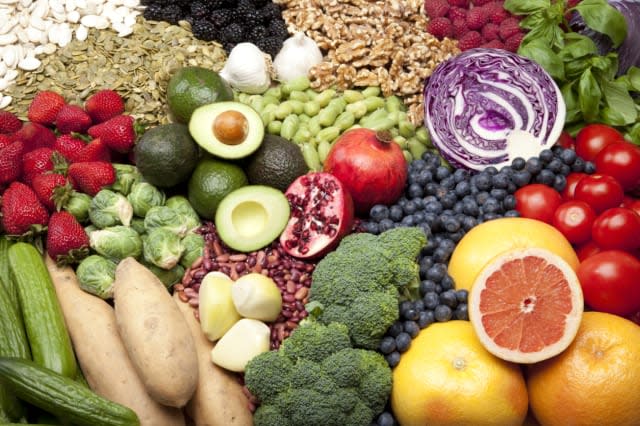Six best superfoods for men over 50


You can't get away from superfoods these days, whether it's blueberries with your breakfast, avocado on toast for lunch or quinoa for dinner – but different foods suit men and women's needs better at varying times of their lives. So here are six things you might want to add to your shopping list if you're male and over 50...
See also: Why eating apples is good for you
See also: These cuisines may help you live longer
Beans (diabetes)
Research shows that men are more likely to develop Type 2 diabetes than women for a given BMI – something to think about if you're putting on some middle-aged spread. Beans are recommended as one of the very best foods for diabetics, with their low-GI and high-fibre properties ticking all the right boxes. Try adding a tin of chickpeas, butterbeans or black beans to casseroles, soups or curries. Be sure to choose reduced sugar and salt variants if opting for baked beans.

Leafy greens (dementia)
Alzheimer's disease is among the most-feared afflictions by those aged over 50 – and there are a host of conditions and lifestyle factors associated with the development of the illness. While it would be misleading to suggest that eating one thing can prevent it, there is a strong link between eating leafy greens such as spinach, kale, and cruciferous vegetables like broccoli, and lower levels of cognitive decline in older age. Serve them up with a piece of grilled salmon and some cannellini beans and you'll be doing even better.
Beetroot (erectile dysfunction)
It may not be the most romantic of foods, but there's growing interest in beetroot as part of a diet to tackle erectile dysfunction. There's a lack of direct studies so far, but beets are well-proven to have a positive impact on blood flow and blood pressure – both of which have a bearing on ED. Nitric oxide for the root vegetable helps dilate blood vessels, which is a key physical component of bedroom performance. And the purple wonder veg is also used by plenty of elite athletes for its ability improve their endurance day-after-day, so a repeat performance could be on the cards too.
Pumpkin seeds (testosterone production)
Testosterone levels in men drop dramatically after the age of 50, and by the time they reach 80 the hormone is likely to be at just 20 per cent of its peak. This is a perfectly natural and causes no problems in most cases, but some men experience a condition called the andropause or "male menopause" which can bring mood swings, irritability, loss of muscle mass, lack of energy, difficulty sleeping and poor concentration. Pumpkins seeds are relatively high in magnesium, zinc and the amino acid leucine, all of which are thought to promote the production of testosterone.
Oily fish (heart health)
We don't need to tell you why you need to take extra care of your heart as you head past 50 – and it's well-established that good diet and exercise habits are the best way to do so. Oily fish such as salmon and mackerel are packed with omega 3 fatty acids, which help to lower blood pressure, reduce blood clotting and even regulate the heartbeat. And the benefits don't stop there – omega 3 is also understood to help fend off arthritis, dementia, depression and asthma, amongst other ailments.
Red peppers (prostate function)
Vitamin C is a proven antioxidant and its consumption has been shown to decrease the risk of men developing an enlarged prostate. But before you grab that bag of oranges, it's worth noting that only vitamin C in vegetables has been shown to reduce the risk of BPH (benign prostate hyperplasia). Red bell peppers have more vitamin C than any other vegetable, they can be eaten raw or cooked and they taste good – so what are you waiting for?



